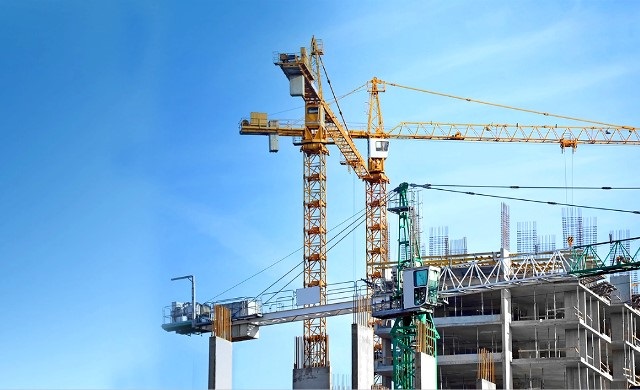Approval of the construction sector Development Strategy in Vietnam
Has the construction sector Development Strategy been approved by the Prime Minister of Vietnam?

Approval of the construction sector Development Strategy in Vietnam (Internet image)
Approval of the construction sector Development Strategy in Vietnam
Content mentioned in Decision 179/QD-TTg in 2024 approving the construction sector Development Strategy to 2030, orientation to 2045, issued by the Prime Minister of Vietnam.
The viewpoint of approving the construction sector Development Strategy to 2030, with a vision for 2045 is as follows:
- Closely follow and concretize development viewpoints, guidelines, and policies related to the tasks of the construction sector in the Resolution of the 13th National Congress of the Party and thematic Resolutions of the Central Government and Resolutions of the National Assembly, the Government, and directions of the Prime Minister.
- Develop the construction sector in a modern direction, based on science and technology, creating breakthroughs that connect, complement, and create development momentum between regions. Proactively grasp and make the best use of the opportunities of the fourth industrial revolution and international integration. Linking sustainable development in the construction sector with strengthening national defense, security, environmental protection, adapting to climate change, and implementing social security policies.
- The State plays the role of guiding and keeping the pace for the real estate, construction, and building materials markets to develop. Strengthen the role of the state in construction planning, as a basis for planning and implementing established tasks and development objectives, oriented according to approved planning.
- Taking innovation in thinking, theory, reform, improvement, and improvement of institutional quality as the central and thorough task. Management of construction investment activities, urban development, housing, and real estate markets must comply with planning and plans, overcoming the situation of scattered, spontaneous, and volatile investments. Prioritize the fields and products of the construction sector with growth, advantages, and high competitiveness, gradually dominating the domestic market, and being able to compete in foreign markets.
- Promote administrative reform, assign tasks and decentralize appropriately, and ensure unified management and smooth direction from central to local levels. Put serving the people at the center. Strongly promote the proactive and positive role of organizations, businesses, and individuals throughout the construction sector.
**General objectives until 2030:
- Promote the improvement of the institutional system and management tools, ensuring completeness, synchronization, unity, modernity, integration, creating a favorable environment, equality, and transparency for entities participating in construction investment activities; and enforce effective and efficient laws in all areas of the construction sector.
- Enhance the capacity of the construction sector to undertake all stages of management, design, procurement, and construction of modern, complex, large-scale construction projects and gradually compete and expand operating markets abroad. Strongly develop the construction materials industry in the direction of saving energy and mineral resources, being environmentally friendly, having high technology content, meeting domestic demand, increasing the export of high-quality construction materials, and developing new construction materials. Applying technology in construction investment management, design, construction, and project quality management.
- Accelerate the speed and improve the quality of urbanization and the urban economy. Develop mechanisms and policies to promote the development of a harmonious urban system, suitable to the potential and advantages of each region and locality; Strongly develop satellite urban areas in some large urban areas, especially Hanoi and Ho Chi Minh City. Basically complete the institutional system, mechanisms, policies, and management tools; build an urban government model associated with effective urban governance and improve competitiveness; Gradually improve the quality of urban development in terms of economy, society, infrastructure, architecture, housing, and people's quality of life.
- Innovate and improve the quality of construction planning; build modern, sustainable, and richly identifiable architecture, promptly meeting cultural development requirements. Urban development has a long-term vision; forming a number of smart urban chains in key economic regions of the North, South and Central regions; gradually connecting to smart urban networks in the region and the world; Building low-carbon cities to reduce greenhouse gas emissions, urban areas are moving towards green cities, with identity, pioneering and leading innovation activities, and becoming the driving force of development.
- Contribute to the basic completion of building a framework technical infrastructure system for central urban areas across the country and regions that is synchronous, modern, and capable of serving. Strengthen the capacity of infrastructure systems to respond to climate change. Gradually develop underground space in large cities. Increase connectivity between domestic and regional urban areas; linking urban and rural development.
- Develop a transparent mechanism for assessing real estate value according to market mechanisms. Fundamentally solve housing requirements for urban residents, expand housing types; have policies to support promoting social housing development.
More details can be found in Decision 179/QD-TTg in 2024.
- Number of deputy directors of departments in Vietnam in accordance with Decree 45/2025/ND-CP
- Cases ineligible for pardon in Vietnam in 2025
- Decree 50/2025 amending Decree 151/2017 on the management of public assets in Vietnam
- Circular 07/2025 amending Circular 02/2022 on the Law on Environmental Protection in Vietnam
- Adjustment to the organizational structure of the Ministry of Health of Vietnam: Certain agencies are no longer listed in the organizational structure
- Vietnam aims to welcome 22-23 million international tourists in Vietnam in 2025
-

- Emergency response and search and rescue organizations ...
- 10:29, 11/09/2024
-

- Handling of the acceptance results of ministerial ...
- 09:30, 11/09/2024
-

- Guidance on unexploded ordnance investigation ...
- 18:30, 09/09/2024
-

- Sources of the National database on construction ...
- 16:37, 09/09/2024
-

- General regulations on the implementation of administrative ...
- 11:30, 09/09/2024
-

- Notable new policies of Vietnam effective as of ...
- 16:26, 11/04/2025
-
.Medium.png)
- Notable documents of Vietnam in the previous week ...
- 16:21, 11/04/2025
-
.Medium.png)
- Notable documents of Vietnam in the previous week ...
- 16:11, 02/04/2025
-
.Medium.png)
- Notable new policies of Vietnam to be effective ...
- 16:04, 02/04/2025
-
.Medium.png)
- Notable new policies of Vietnam effective from ...
- 14:51, 21/03/2025

 Article table of contents
Article table of contents
